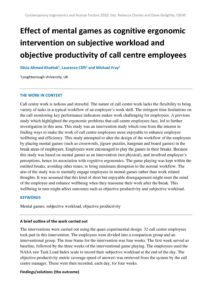| Document | Author Silvia Ahmed Khattak, Laurence Clift and Michael Fray |
| Abstract Call centre work is tedious and stressful. The nature of call centre work lacks the flexibility to bring variety of tasks in a typical workflow of an employee’s work shift. The stringent time limitations on the call monitoring key performance indicators makes work challenging for employees. A previous study which highlighted the ergonomic problems that call centre employees face, led to further investigation in this area. This study was an intervention study which rose from the interest in finding ways to make the work of call centre employees more enjoyable to enhance employee wellbeing and efficiency. This study attempted to alter the design of the workflow of the employees by placing mental games (such as crosswords, jigsaw puzzles, hangman and board games) in the break areas of employees. Employees were encouraged to play the games in their breaks. Because this study was based on mental games as an intervention (not physical), and involved employee’s perceptions, hence its association with cognitive ergonomics. The game playing was kept within the entitled breaks, avoiding other times, to bring minimum disruption to the normal workflow. The aim of the study was to mentally engage employees in mental games rather than work related thoughts. It was assumed that this kind of short but enjoyable disengagement might reset the mind of the employee and enhance wellbeing when they reassume their work after the break. This wellbeing in turn might affect outcomes such as objective productivity and subjective workload. |

